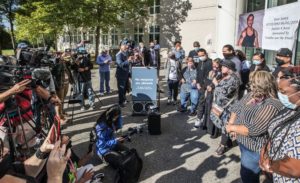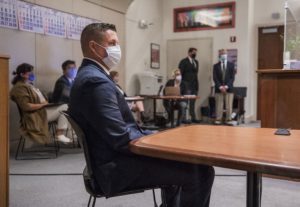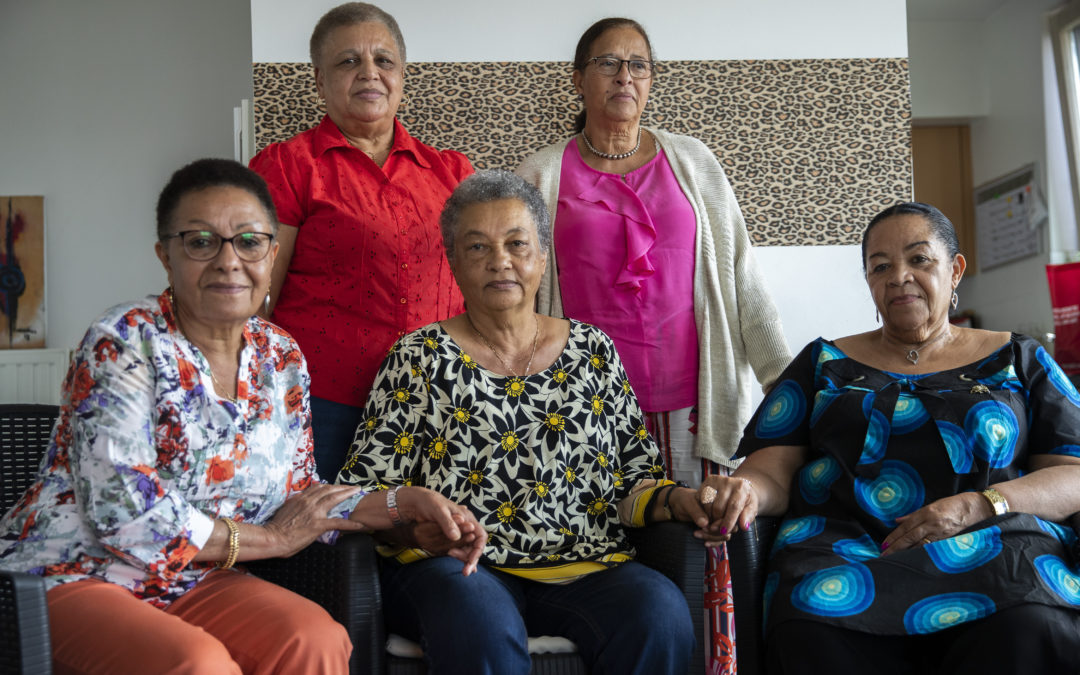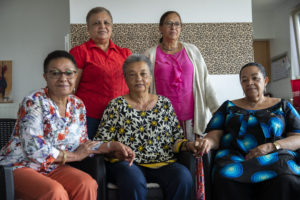
Tool for police reform rarely used by local prosecutors

In this May 31, 2019, photo provided by the Auburn Police Department via the Port of Seattle Police Department, Auburn police Officer Jeff Nelson, second from right, is shown at the scene where he shot and killed Jesse Sarey in a grocery store parking lot in Auburn, Wash. Although Nelson has been investigated in more than 60 use-of-force cases since 2012, he wasn’t placed on the King County Prosecuting Attorney’s “potential impeachment disclosure” list, or Brady List, which flags officers whose credibility is in question due to misconduct, until after he was charged in Sarey’s killing. (Auburn Police Department via Port of Seattle Police Department via AP)
SEATTLE (AP) — Isaiah Obet was behaving erratically and in mental distress in 2017 when Officer Jeff Nelson ordered his police dog to attack and then shot Obet in the torso. Obet fell to the ground and Nelson fired again, fatally shooting Obet in the head. The officer said his life was in danger.
The next year, Joseph Allen was crossing in front of Nelson’s patrol car when the officer swerved and pinned him against a fence, breaking both his ankles. His justification: Allen was a dangerous criminal.
In 2019, Nelson scuffled with Jesse Sarey after attempting to arrest him for disorderly conduct. He punched Sarey seven times and then shot him in the torso. After Sarey fell to the ground, Nelson killed him with a second shot to the forehead. He claimed Sarey was on his hands and knees “ready to spring forward,” which later was disproved by both video and witnesses.
Nelson’s actions in all three cases were outlined in a criminal complaint, eyewitness accounts, and police dashcam video obtained by The Associated Press. In the past decade, Nelson has been investigated in more than 60 use-of-force cases that involved choking suspects until they passed out, severe dog bites, and physical force that required medical care. But he was not on the King County Prosecuting Attorney’s list that flags officers whose credibility is in question due to misconduct – a designation that must be shared with defense attorneys.
Nelson was only added to its “potential impeachment disclosure” list, or Brady List, after he was charged with killing Sarey. A trial is set for February 2022. Mohammad Hamoudi, a federal public defender, said given Officer Nelson’s history, all of his cases should be reviewed. And he hopes his story will encourage prosecutors to track excessive force cases involving other police officers.
“It has to do with respect for the rules, the laws, and others,” he said. “If an officer lacks impulse control or the ability to exercise informed judgment, you can call into question how he investigates cases.”
The murder of George Floyd by a Minneapolis police officer has sparked a national conversation on police reform, ranging from defunding departments to enhancing training. But reform activists and civil rights advocates say prosecutors already have powerful tools at their disposal to curb bad behavior by police: They can use Brady Lists to shine a light on troubled officers, and they can then refuse to put forward cases from those officers with tarnished histories.

FILE – In this Aug. 24, 2020, file photo, family members and supporters of Jesse Sarey gather outside the King County courthouse in Kent, Wash., after Auburn police Officer Jeffrey Nelson pleaded not guilty to charges in the killing of Sarey in 2019. Although Nelson has been investigated in more than 60 use-of-force cases since 2012, he wasn’t on the King County prosecuting attorney’s “potential impeachment disclosure” list, or Brady List, which flags officers whose credibility is in question due to misconduct, until after being charged in Sarey’s death. An Associated Press investigation based on hundreds of documents and interviews with prosecutors, defense attorneys and experts on police reform found that prosecutors do not always used the lists to ensure accountability. (Steve Ringman/The Seattle Times, File via AP)
The AP found that prosecutors sometimes don’t even compile the lists and that wide disparities in what offenses land officers on them are prevalent across the country, with excessive force often failing to merit inclusion.
The AP also found that many prosecutors and police unions have gone to great lengths to keep Brady List information from becoming public.
Now, defense attorneys, public defenders, civil rights groups and even some prosecutors are calling for an increased use of Brady Lists and a broadening of the offenses that will land a police officer on them, while police unions are resisting those efforts.
Amy Parker of the King County Department of Public Defense called it imperative for officers’ violent histories to be exposed.
“As a career public defender, I have listened to prosecutors routinely make the argument that defendants with prior unlawful uses of force/crimes of violence are more prone to violence and lack credibility,” she said in an email. “If prosecutors are going to apply that standard to defendants, then the same standard should apply to police officers when judging their conduct.”
King County prosecutor Dan Satterberg argues excessive force doesn’t make an officer less credible. “An officer who was accused of using too much force in an unrelated arrest has nothing to do with the impeachment of their veracity,” he said.
Brady Lists stem from a ruling in the 1963 Supreme Court case Brady v. Maryland mandating prosecutors turn over exculpatory evidence to defense attorneys, including information that could be used to question the officers’ credibility. But the ruling did not define the steps prosecutors and police departments must take to ensure defendants are informed or whether lists of troubled officers must be kept at all.
The result, critics say, is a mishmash of policies that vary state to state — and even jurisdiction to jurisdiction.

FILE – In this Aug. 24, 2020, file photo, Auburn police Officer Jeff Nelson appears in King County Superior Court court in Kent, Wash. Nelson pleaded not guilty to charges in the killing of Jesse Sarey in 2019. Although Nelson has been investigated in more than 60 use-of-force cases since 2012, he wasn’t on the King County prosecuting attorney’s “potential impeachment disclosure” list, or Brady List, which flags officers whose credibility is in question due to misconduct, until after being charged in Sarey’s death. An Associated Press investigation based on hundreds of documents and interviews with prosecutors, defense attorneys and experts on police reform found that prosecutors do not always used the lists to ensure accountability. (Steve Ringman/The Seattle Times, File via AP)
Prosecutors in Atlanta, Chicago, Tulsa, and Pittsburgh told the AP that they don’t track officers with disciplinary problems, and Milwaukee prosecutors only listed officers who have been convicted of crimes.
The Dallas County district attorney’s list contained 192 names, with infractions ranging from making false statements to convictions for theft, assault, and driving under the influence. The Suffolk County, Massachusetts, prosecutor’s list included Boston officers who lied on their timesheets or embezzled funds. Louisiana’s Orleans Parish district attorney tracked officers who committed crimes, lied, or drove dangerously, but not violent arrests.
Dishonesty lands an officer on the list in Detroit, Denver, and Seattle, but using excessive force does not.
The Phoenix district attorney, along with prosecutors in Orange County, Florida, and Los Angeles, were among the few the AP found who include excessive use of force cases on their lists.
“It’s like there’s a huge continuum and the result is you don’t have the same procedures being followed not only across the country but within individual states,” said Will Aitchison, an attorney with Portland, Oregon-based Labor Relations Information Systems, which represents officers after they’ve appealed discipline orders.
Some states have attempted to pass legislation that would address the lack of consistency, including the Washington State Legislature, which approved a bill this year requiring county prosecutors to develop written protocols for collecting potential impeachment information by July 2022.
The California Legislature approved a bill last year that required prosecutors to maintain a list of officers who have had “sustained findings for conduct of moral turpitude or group bias,” but Gov. Gavin Newsom vetoed the measure due to the cost of such “a significant state mandate.”
__
When Larry Krasner was elected Philadelphia district attorney in 2017, his staff discovered a “do not call” list of police officers that had been compiled by a previous prosecutor.
The officers had a history of lying, bias, and excessive force and were barred from testifying “absent explicit permission from the highest levels of the district attorney’s office.”
Krasner shared the list with defense attorneys, who used the information to challenge the convictions of people imprisoned by testimony from those officers and has continued to provide timely Brady material to public defenders.
“When my client goes for a preliminary arraignment first appearance in court where they set bail, the prosecutor might disclose 20 to 30 or 40 pages of materials that they’ve generated on a particular police officer,” Philadelphia public defender Bradley Bridge said.
Using Brady List information, Bridge has filed motions to dismiss about 6,000 convictions based on officer misconduct, with more than 2,000 convictions thrown out so far.
Bridge acknowledges some of those released might be guilty.
“The problem is, there’s no way to know,” he said. “I have no idea how to evaluate whether they’re guilty or not guilty because the officer’s behavior in the cases is too tainted.”
Bridge has filed more than 500 petitions to reopen convictions tied to a sole officer who admitted falsifying records — Christopher Hulmes of the Philadelphia Police Department’s Narcotics Strike Force, who was charged in 2015 with perjury and tampering with public records. So far, 357 of those convictions have been dismissed, many involving drugs and guns, Bridge said.
Krasner said he feels prosecutors have both a legal and moral obligation to use Brady Lists, but that local police have pushed back.
Last month, he asked for the Philadelphia Police Department to be held in contempt for not cooperating with his request for officer disciplinary material.
Kym Worthy, the prosecutor for Wayne County, Michigan, which includes Detroit, also is disclosing Brady List material to defense attorneys and the public “because in an era of criminal justice reform,” she said, “it just makes sense.”
Worthy has compiled a list of officers who have committed offenses involving theft, dishonesty, fraud, bias or bribery, saying officers who commit these crimes have lost their credibility and won’t be called to testify.
St. Louis Circuit Attorney Kim Gardner also has said she won’t take criminal cases filed by untrustworthy officers and has an “exclusion list” with more than 50 names.
“The union’s predictable over-the-top ‘sky is falling’ reaction to any attempt to distinguish the vast majority of honest and hardworking officers from the few bad actors is one big reason why community relations with the people they serve are so frayed,” Gardner said.
Last year, police misconduct records were at issue in the hotly contested Los Angeles district attorney race between Jackie Lacey and former San Francisco District Attorney George Gascon, who had been the San Francisco police chief when now Vice-President Kamala Harris was the city’s district attorney and became the DA when she ascended to the state attorney general job.
Gascon had partnered with Harris and the police union to establish a “do not call” list that became the model for the state. After he won the Los Angeles election, he sent letters to local law enforcement agencies seeking the names of officers involved in 11 categories of misconduct, including bribery, theft, evidence tampering, dishonesty, and unreasonable force.
“If the officer’s history is such that we just don’t believe the officer, period, we will not use him,” Gascon said.
______

In this March 14, 2017, file photo, King County Prosecutor Dan Satterberg speaks at a news conference in Seattle. Auburn police Officer Jeffrey Nelson has been charged in the 2019 shooting of Jesse Sarey, and has been investigated in more than 60 use-of-force cases since 2012, but he wasn’t on the prosecutor’s “potential impeachment disclosure” list, or Brady List, which flags officers whose credibility is in question due to misconduct, until after being charge in Sarey’s death. An Associated Press investigation based on hundreds of documents and interviews with prosecutors, defense attorneys and experts on police reform found that prosecutors do not always used the lists to ensure accountability. (AP Photo/Elaine Thompson, File)
Settlement agreements — and many police union contracts — often prohibit the release of the names of officers named in disciplinary records, but Brady Lists can blow open those closed doors.
The contract between Seattle and its police department, for instance, prohibits releasing disciplined officers’ names. But the Brady Lists sent to the AP by the King County prosecuting attorney included 51 Seattle officers.
Seventeen of those officers had criminal charges filed against them, 26 had sustained findings of dishonesty, six had shown racial bias and one violated the department’s ethics policy.
An investigation by the Office of Police Accountability found that a Seattle officer violated policies against biased policing by posting offensive comments on social media in 2019. The office was prohibited from naming the officer and so referred to him in its report as Named Employee #1, but the Brady List identified him as Ron Smith.
One of Smith’s social media comments “stated that the Islamic religion was not one of peace, suggesting that the Islamic religion and all of its approximately 1.57 billion adherents were supportive of violence,” the OPA report said.
Another post targeted Gov. Jay Inslee, a Democrat, saying: “you weak wristed lefties don’t want border security … you want votes to keep your anti-American party in power,” the report said.
Smith resigned, but the OPA investigation did find that he engaged in “bias-based policing.”
Another Seattle officer on the Brady List was Salvatore Ditusa, who was working a side job flagging traffic when he approached three workers and “engaged in a diatribe that included multiple racial slurs towards African Americans,” the OPA said. Ditusa also resigned. The OPA found that he had also engaged in biased policing.
In Los Angeles, the battle over disclosing officer misconduct information traveled all the way to the state’s highest court.
When Jim McDonnell took over the Los Angeles Sheriff’s Department, he wanted to share the list of officers accused of misconduct with the prosecutor’s office, but both sides were concerned that a state law — the peace officer’s bill of rights — would prohibit the move.
After the police union filed an injunction to block any sharing, the case went to the state Supreme Court, which ruled in 2019 that prosecutors could be given the list.
One of the people named was homicide detective Daniel Morris.
In 2003, a car theft suspect had said Morris and other officers kicked, punched, and stomped on him – an accusation Morris denied to three different supervisors. But he eventually admitted to the beating, receiving a 30-day suspension.
That information was not shared with the district attorney’s office until 2019.
Ten years before that, Morris had investigated the murder of a gang member in Paramount, California, obtaining a search warrant for the home of Filipe Angel Acosta.
Morris testified that Acosta, who had no criminal history, was associated with a gang and he was charged with drug possession, with a gang enhancement.
Acosta refused a deal that would have involved admitting to gang involvement, but changed his mind and entered a plea of no contest after getting sick in jail and being hospitalized.
At no point did the district attorney reveal that Morris had been disciplined for dishonesty.
When Morris’ misconduct finally was disclosed, Acosta filed a motion to overturn his conviction because of the prosecutor’s Brady violation. The charges were dismissed.
As a 2013 report on the sheriff’s department by a civilian oversight group called the Office of Independent Review put it: “Instances of deputies lying in reports or during investigations do not simply affect the immediate case at hand. Instead, they may influence the outcome of every other case in which the deputy’s testimony is considered.”






